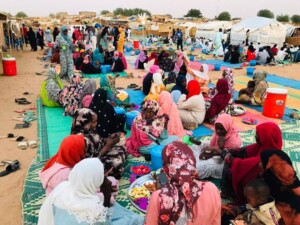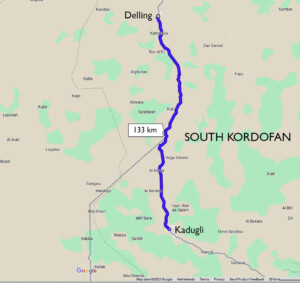More policewomen, less support for rape victims in North Darfur
EL FASHER –
The acting governor of North Darfur on Wednesday announced a plan to recruit more than 3,000 policewomen in the coming days. The work of a Sudanese NGO providing support to victims of sexual violence has been suspended by the authorities in the state capital El Fasher.
During his address to the celebration of International Women’s Day in El Fasher on Wednesday, Governor Nimir Abdelrahman said that the plan to recruit, train and deploy more policewomen in North Darfur aims “to combat manifestations of violence against women. At the same time the project will provide more job opportunities for women.”
Displaced women in called on the North Darfur state government to implement the various laws concerning the protection of women.
Displaced women activist Awatif Hussein welcomed the plan to deploy policewomen. She said during the celebration in El Fasher that women in the camps for the displaced are subjected to “the worst types of violence and rapes”, while they situation forces them to hard labour and to leave the camps where they are prone to attacks.
Transparency
The North Darfur Ministry of Social Welfare and the United Peace Organisation earlier this week exchanged accusations about the reasons for stopping women support activities of the NGO in the state.
The ministry’s director, Ibrahim Mousa, told Radio Dabanga that the activities of the United Peace Organisation concerning the support of women and girls were suspended “not because of the content, but because of the way they were implemented”. He added that the activities fall within the ministry’s jurisdiction.
The suspended activities are concerned with the training of people to provide psychological and social support to victims of gender-based violence, how to set up awareness-raising sessions on violence and sexual exploitation, in addition to distributing health kits to teenage girls, establishing protection networks, and offering safe places for women victims and girls.
Mousa denied claims of the director of the organisation’s office in El Fasher who said that the ministry suspended the activities because of its refusal to pay three percent of the value of the projects to the ministry.
He further explained that the budgets for the NGO’s activities were very high. “Not all figures were accounted for.”
The ministry suspended the activities in February due to a lack of clarity, transparency, and coordination, he said, and stressed that that the ministry did not ask for cash amounts, but rather an in-kind compensation, “such as fuel, tools, and office equipment”, for the evaluation and follow-up of the projects.
The suspension comes within the framework of the ministry’s plan to tighten control over the work of the organisations and include their activities in the ministry’s reports so that the state government will be able to evaluate the funding of the organizations.
The ministry director downplayed the impact of stopping the organisation’s activities on the beneficiaries, as three other organisations are implementing similar projects.
Policewomen
The issue of more women police officers has never been a priority for the Al Bashir regime (1989-2019), though the need is more than pressing.
In September 2021, Kamelia Kuku, Director of the Omdurman-based Nuba Women Organisation for Education and Development stressed the need to appoint police women in the countryside, in particular in remote places.
More women should join the police, and more police women should be trained in dealing with victims of sexual violence, to realise better mental care and justice for them, she said in a workshop on the subject held in Khartoum.
Rape cases should be treated “confidentially and with respect” by the authorities. Women police officers could be of better help to victims’ and their families’ as they often fear for scandals which often refrains them from filing an official complaint.











 and then
and then